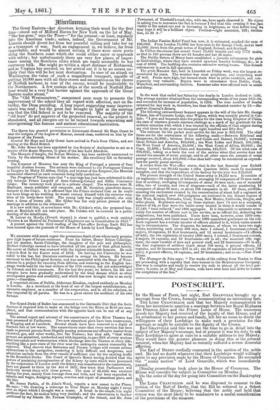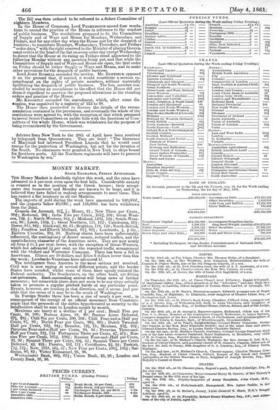POSTSCRIPT.
IN the House of Peers, last night, Earl GRANVILLE brought up a message from the Crown, formally communicating an interesting fact. Tax LORD CHANCELLOR said that her Majesty communicated to them her intention to sanction a marriage between her Royal Highness the Princess Alice and the Prince Louis of Hesse. The numerous proofs her Majesty had received of the loyalty of that House, and of its attachment to her person and family, left her no room to doubt the willing ess of their Lordships to snake such a provision for this marriage as might be suitable to the dignity of the Crown. Earl Gritswviuu said this was not the time to go in detail into the subject of her Majesty's message, but at present it was his duty_ to ask their Lordships to agree at once to a suitable address to her Majesty. They would have the greater pleasure in doing this at the present moment, when her Majesty had so recently suffered a severe domestic affliction. The Earl of DERBY cordially concurred in the motion of the noble earl. He had no doubt whatever that their Lordships would willingly agree to any provision made by the House of Commons. He seconded the "manly motion" of Lord Granville, which was immediately passed.
[Similar proceedings took place in the House of Commons. The House will consider the subject in Committee on Monday.] On the order of the day for going into Committee on the Bankruptcy Bill,
The Loan CHANCELLOR said he was disposed to consent to the motion of the Earl of Derby, that the Bill be referred to a Select Committee of the House; believing that the noble earl held that course was the most likely to be conducive to a useful consideration of the provisions of the measure. The Bffi was-then ordered to be referred to a Select :Committee of eighteen Members. in the House of Commons, Lord PALMERSTON moved four resolu- tions -to amend the practice of the Honse-in reference to the conduct
of public business. The resolutions proposed to fix the Committees of Supply and of Ways and Means for Mondays, Wednesdays, and Fridays, and for any other day when the House met for the despatch of business; to constitute Mondays, Wednesdays, Thursdays, andF'n'clays " order-days," with the right reservedto the Ministry of placin g'Govern- went orders at the head of the list on every order-day except Wednesday; to direct that the House at its rising on Fridays stand adjourned to the following Monday without any question being put, and that while the Committees of Supply and of Ways and Means are open, the first order on Friday should be either Supply or -Ways and Means, and to make other provisions for the despatch of public business. Lord JOHN RUSSELL seconded the motion. Mr. Betrrnock opposed it on the ground that if -carried, it would constitute w serious en-
croachment on the rights of private members, without materially facilitating the despatch of of public business. The ton, member con- cluded by moving an amendment to the effect that the House did not deem it expedient to sanction the proposed alterations in the standing orders and practiceof the House. Mr. KNIGHTLY seconded the amendment, which, after some dis- suasion, was negatived by a majority of 253 to 98. The House then proceeded to discuss the details of the recom- mendation -contained in the provisions, and eventually the whole of the resolutions were agreed to, withthe exception of that which proposed toinyest SelectOommittees on public bills with the funetions.of Com- mittees of the whole House, which-was withdrawn for the purpose of beingTeconsidereilly-the'Gcrvernment.































 Previous page
Previous page